Des Moines City Council moves forward on MidAmerican franchise agreements
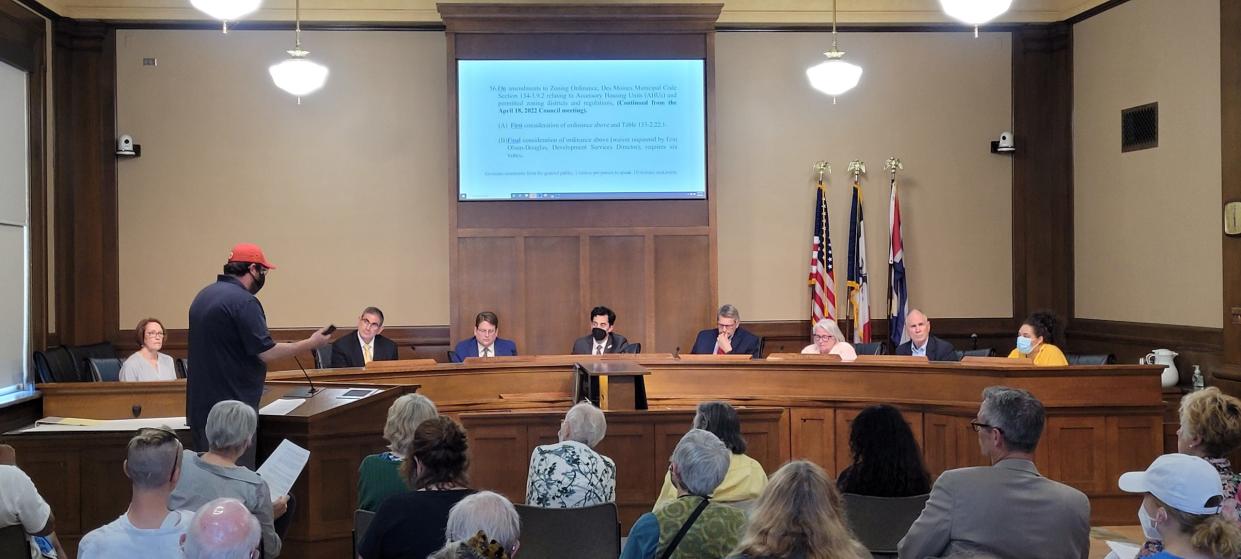
- Oops!Something went wrong.Please try again later.
The Des Moines City Council voted to advance extensions of MidAmerican Energy's electric and natural gas franchise agreements for 13 years.
The city's current 10-year franchise agreements with MidAmerican expire June 15. MidAmerican could provide the city electricity and natural gas after June 15, but the city would lose franchise fees until new agreements are approved. The council voted 5 to 1 Monday evening to advance both electric and natural gas franchise agreements, with only Ward I Councilperson Indira Sheumaker voting against both proposals.
The agreements will be read again at a special council meeting May 17 and will likely be voted on again in June. Ward III Councilmember Josh Mandelbaum recused himself from the the discussion because he is an environmental lawyer who advocates for clean energy at his day job at the Environmental Law & Policy Center. His company joined a group called Clean Up MidAm that is focused on retiring MidAmerican's coal-fired power plants by 2030.
"I don't want there to even be a claim of a conflict of interest," Mandelbaum said.

In January 2021 Des Moines set a goal of having 100% 24/7 carbon-free electricity by 2035, a goal no other city in the country has. Dozens of cities have committed to 100% clean energy goals, but most of those rely on non-renewable sources, such as coal or natural gas, when there is no sun or wind. Cities can purchase clean energy through wind and solar power sources to balance out non-renewable sources over the course of a year and claim they use 100% clean power.
Mayor Frank Cownie, the president of the international group Local Governments for Sustainability, said Monday that during the time of the agreement, the city should work to be carbon-free.
By 2030, city officials also want to reduce greenhouse gas emissions by 45% from 2010 levels and have net-zero emissions by 2050. Des Moines City Manager Scott Sanders said the franchise agreements only cover the use of right of ways. A side agreement would cover the city and the utility's commitment to renewable energy, Sanders said.
The city collects $12 million per year in franchise fees.
"It's incredibly crucial we do not put at risk that $12 million for franchise fees," Sanders said.
Des Moines resident Taylor Webber countered that those fees come from money paid by the city's residents. Ward IV Councilmember Joe Gatto said the city would have to raise taxes or cut services without that money.
"No one would want to live here if we did that," Gatto said.
More: Opinion: Des Moines should preserve MidAmerican Energy relationship with franchise agreement
Des Moines-based MidAmerican generated almost 88% of the power used by its Iowa customers from renewable sources in 2021. The utility announced in January that it plans to spend $3.9 billion to develop more solar and wind energy.
MidAmerican also announced it plans to study emerging technologies including battery storage, small modular nuclear reactors and using carbon-capture techniques to reduce greenhouse gas emissions from its remaining coal-fired power plants.
MidAmerican has coal-fired power plants in Woodbury County near Sioux City, Council Bluffs and Louisa south of Muscatine. Alliant Energy runs a plant near Ottumwa, of which MidAmerican owns 52%, according to the Ottumwa Courier. MidAmerican plans to retire its coal-fired power plants by 2049, according to its website.
Des Moines Sustainability Program Manager Jeremy Caron told the Des Moines Register the city does not know how much of its energy comes from renewable sources, but the city intends to track that information soon through work being done on the side agreement.
On Monday, Des Moines residents who spoke said they supported the agreement as long as it contained options to exit it around years three, five or eight. The draft of the agreement allows it to be amended, but not exited, at year five.
Sanders said the city first approached MidAmerican with a three-year agreement. Kathryn Kunert from MidAmerican Energy said the utility started negotiations with a proposed 25-year agreement.
"Regardless of the technology, regardless of where the electron comes from, it still costs money to serve our customers," Kunert said. "Having that (assurance) to put in the infrastructure to serve our customers ... makes a difference."
More city council news: Des Moines City Council tables vote to expand areas where accessory dwelling units can be built
Sheumaker said she would support the franchise agreement if it contains options for the city to exit it during a check in at 2030 to determine if it is meeting its renewable energy goals.
“I feel like we’re setting ourselves up for failure," Sheumaker said.
Gatto also touted the reliability of MidAmerican's electricity and said Des Moines does not have rolling blackouts like other cities.
At Large Councilmember Connie Boesen said that MidAmerican will likely not shut down its coal power plants if the city does not renew the agreements.
“If we don’t agree to it, what is our alternative?" Boesen said. “As a city we came up with not exactly what everybody wants, … but we’re putting in things that we’ve never ever had before," referring to the side agreement that lays out renewable energy commitments.
Accessory dwelling unit plan approved
The council voted 6 to 1 to significantly expand areas where accessory dwelling units can be built.
Accessory dwelling units, or ADUs, are essentially homes or apartments within, attached to or near the land of a separate home. They can be attached to homes or stand separately on the same property. ADUs are often seen as a way to make housing more affordable, or for multi-generational families to live together.
The council was expected to approve a plan April 18. However, councilmembers Josh Mandelbaum, Indira Sheumaker, Linda Westergaard, Connie Boesen and Joe Gatto expressed concerns about the ordinance. So it was rolled forward to the May meeting.
ADUs must have a kitchen, bathroom and sleeping spaces so that residents can live independently of homeowners. They cannot be more than half the size of the primary dwelling and have at least one off-street parking space. Either the home or the ADU must be owner-occupied.
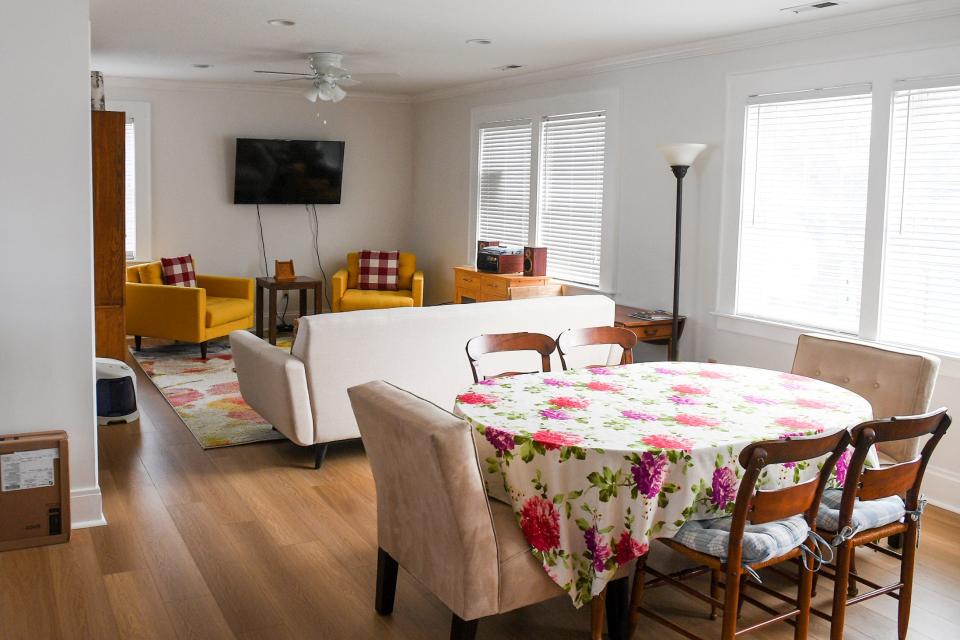
More: What is an ADU? What to know about accessory dwelling units as Des Moines looks at changes
The city is using the term accessory housing unit, though the term accessory dwelling unit is more commonly used.
In 2019, Des Moines approved ADUs only in zoning districts that allowed up to four units to be built on a single lot. Before the plan was approved, ADUs could be built on about 10% of land in Des Moines. ADUs will now be allowed on 78% of land in Des Moines. The other 22% consists of types of land that allow other forms of multi-family housing.
Under the plan all single-family lot owners could build ADUs, but if those lots sit more than a quarter-mile from a public transportation route, owners would need to get conditional use permits before construction could begin. ADUs would be permitted without conditional use permits on any single-family lot within a quarter-mile of a transit route and in any zoning district that allows two or more units on site.
Mandelbaum said Monday he supported the proposal after talking with neighbors after the April 18 meeting.
Gatto said neighborhood associations like the current process. He voted against the ordinance.
"We have a process right now," Gatto said. "In theory, I think it's great. You could move a family member out there, but you could also move whoever out there."
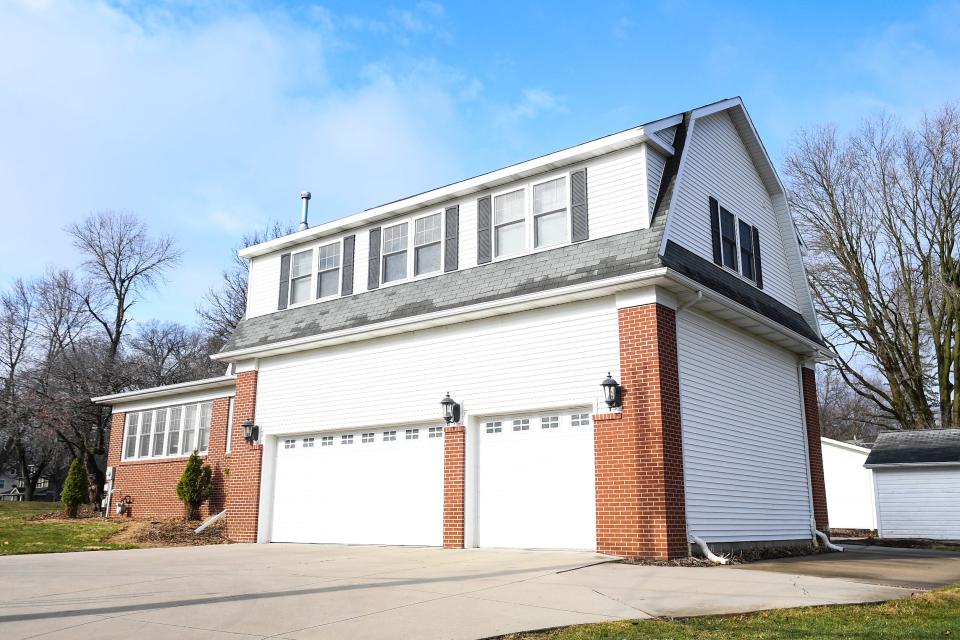
Sheumaker said that neighbors do not get to decide who lives in apartment complexes.
“Your neighbors don’t get to decide who gets to build a shed in your backyard," Sheumaker said.
Brad Anderson, state director of AARP of Iowa, praised the passage of the ordinance.
“Affordable housing is a serious challenge facing all Des Moines residents, especially older Iowans on a fixed income," Anderson said in a statement. "We don’t have many empty lots in Des Moines, but we do have basements and backyards where we can build AHUs and increase the affordable housing stock for a fraction of the cost of building a new home."
More: What is an ADU?
American Rescue Plan funds will be used to address homelessness
The council unanimously approved a plan to use $3.56 million in American Rescue Plan funds for programs to address homelessness in Des Moines.
Under the proposal, about $2.86 million would be used to develop affordable rental housing, according to a memo sent to councilmembers. Nonprofits would receive $177,815 for operating expenses. Administrative costs would account for 15% of the spending.
Crescent Chevrolet sign to be restored
Des Moines' skyline will shine a little brighter after the council approved a developer's plans to restore the Crescent Chevrolet sign at 555 17th St.
Crescent Chevrolet opened in 1931 and operated at the site from 1968 to 2007. In 1968, the building that currently sits at the site was constructed for $1 million and the 28-foot-wide sign was placed on the roof's southwest corner, facing Ingersoll Avenue.
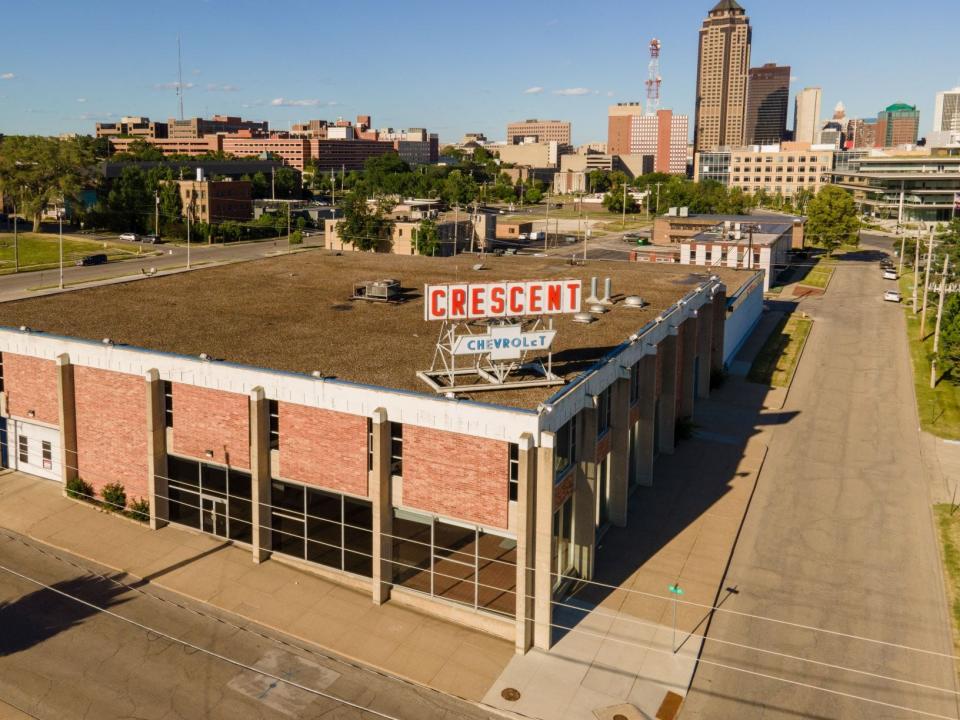
Des Moines developer Krause+ is renovating the building. Big Grove Brewery will open a Des Moines location in the eastern half of the building, with retail and office space also in the works. In April Des Moines' Landmark Review Board declared the sign a local landmark.
More: Crescent Chevrolet sign in Des Moines declared local landmark
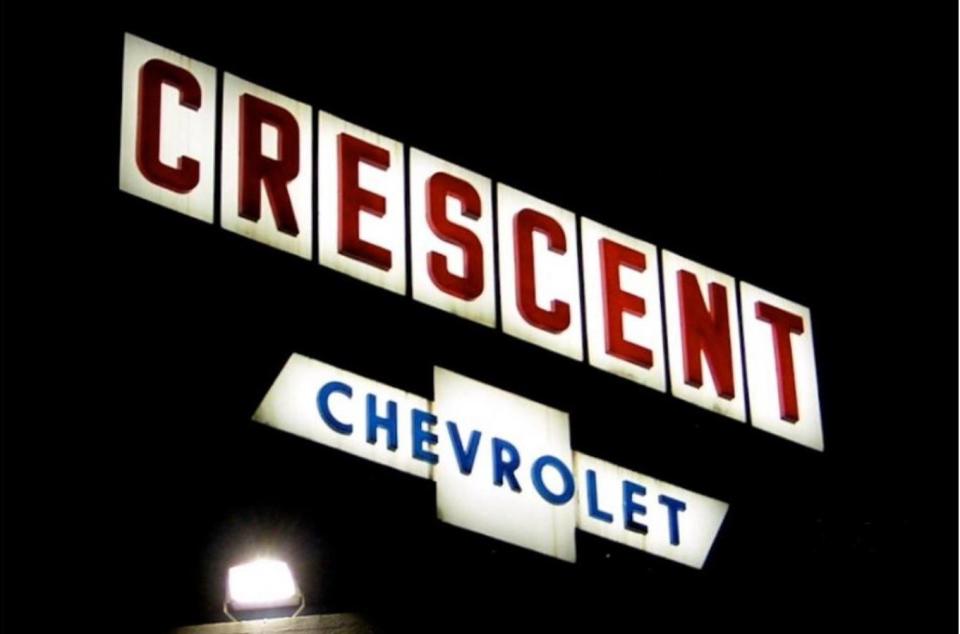
Lights inside the 54-year-old sign stopped working in 2007. Today its metal pieces are rusting, paint is chipped and weathered and some plastic pieces are broken.
Under the plan, the word "Chevrolet" will be removed from the bottom portion of the sign so the company's trademark will not be violated. The Chevrolet bow tie will remain.
The council also approved plans for developer Connor Delaney to renovate the French Way Cleaners & Dyers building at 413 Euclid Ave. In the $4.2 million plan, the 18,000-square-foot building would be turned into apartments and commercial space.
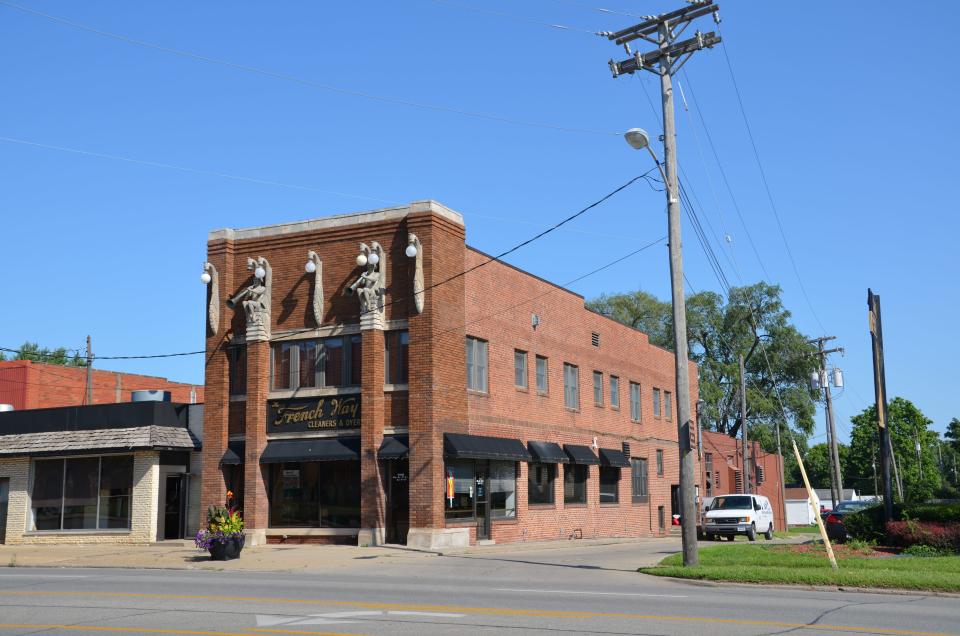
More: Developer restoring home of French Way Cleaners in Highland Park finds, returns unexpected heirlooms
A plan by Waterloo-based SingleSpeed Brewing Co. to redevelop a former tire shop at 303 Scott Ave and turn it into a bar and brewery was also approved. Construction on the $45.4 million plan is expected to begin this summer, and the project is expected to be finished next spring.
More: Waterloo-based SingleSpeed Brewing Co. plans a location in Des Moines' Market District
Clarification: This article was updated to clarify the reasons Ward III Councilmember Josh Mandelbaum recused himself from a discussion about an extension of MidAmerican energy's franchise agreement.
Philip Joens covers public safety, city government and RAGBRAI for The Des Moines Register. He can be reached at 515-443-3347 at pjoens@registermedia.com or on Twitter @Philip_Joens.
This article originally appeared on Des Moines Register: Des Moines City Council advances MidAmerican franchise agreements

